- Home
- Craig Martelle
Return (End Times Alaska Book 3) Page 3
Return (End Times Alaska Book 3) Read online
Page 3
MILITARY BRIEFINGS
The military wanted to take my old cell phone to download all the pictures. I told them to get bent. Then a general showed up and ordered me to give up my phone. I wanted to tell him the same thing, but took a different approach.
“Listen, General, you and I both know I’m back on active duty because the President feels guilty about losing Alaska. Maybe my recall made him feel better. I don’t know, and I don’t care. This is my private phone, and I’m not giving it to you. I am more than happy to share the pictures, but this phone is not leaving my sight. I haven’t downloaded the pictures since we escaped. I’d like to keep them. And for a few million dollars’ worth for my memoirs, these pictures will save me a lot of writing time.” I stood unmoving as the general tried to glare at me.
“When we were there, in the DMZ, soldiers, our soldiers, shot at me while we were only trying to survive. I don’t who issued those orders, but don’t let them get anywhere near me.” I leaned close to him, and although he was physically bigger than me, he withered. The United States military firing on its own within the United States had to make him sick to his stomach.
He gave up quickly. Maybe he wasn’t a fan of how the war was managed. We had that in common. I wasn’t a fan either. Maybe he realized that I wasn’t asking for much. They could have the pictures, just not the phone.
He waved an Army master sergeant over and directed him to have IT come to the conference room with whatever they needed to download the pictures. He also told him to bring an extra thumb drive to give me a copy. I appreciated the gesture. It saved me from doing the same thing later.
That reminded me. I needed to download all my music to the new phone. I wanted to use it when I no longer had service upon our return to the Great State. I wanted to download more music, too. I expected Madison would do the same. Money was no longer an issue. Only our time seemed to be at a premium.
The Pentagon’s IT guru showed up. The Air Force sergeant looked like a little kid to me, but they said he was the best when he showed up. There was nothing extraordinary that needed done. I even typed in my password so they could access the phone, which then made it look like the same iPhone connected to the same laptop in tens of millions of homes around the world.
There were thousands of pictures, so it took almost thirty minutes to download everything and another minute to copy the pictures to a thumb drive.
I put the phone back in my pocket next to my new one when they were done.
I thought they’d go away and pore over the pictures, but they didn’t. They projected them onto the screen in the conference room, thumbing through quickly, but stopping at all the ones of a destroyed Fairbanks. The mood in the room sobered immensely. The destruction looked horrific on the big screen. The pictures I took from the overlook at the University of Alaska Fairbanks showed the worst of it.
A colonel requested a map of the city and asked me to show everyone what happened, including follow-up. I asked for a map of Delta Junction and then a road map of all Alaska.
I pointed to the gates at both Fort Wainwright in Fairbanks and Fort Greely in Delta Junction where I was certain the nukes had been detonated. I showed where the checkpoint in Tok was three years ago. They knew about that, though. It was a U.S. military operation. They also knew about the overflight of Chena Hot Springs resort by the U.S. F-16s shortly after our unfortunate encounter at the checkpoint.
Both pilots had been court-martialed for not dropping their bombs. I stood up and pounded my fist on the table. “What the hell?”
“Sit down, Colonel. We didn’t have to tell you that, but thought you deserved to know. They insisted on the court martial to shine the light on failures of our government, and you know, none of this leaves this room. Do you understand me?” I nodded and sat down, freshly disgusted.
“But it never went public. They were tried in private, convicted, and given Administrative Discharges under Other Than Honorable circumstances. This was the lightest punishment they could be given because they pled guilty. They should have said not guilty because of an illegal order to fire on American citizens. You have my word that both men are doing just fine in the private sector. An OTH discharge isn’t a bar to employment.”
I closed my eyes and took deep breaths, a calming technique that Madison had taught me to help with my gastritis. When I opened my eyes, they were all looking at me.
“I’m good. Shall we continue?” It was also unnerving to be called Colonel. I’d been a civilian for a long time and had grown accustomed to the freedom that entailed.
The briefing picked up where we’d left off. I could tell they wanted pictures of the MiG-27 attack, hoping to confirm the treaty violation. The question of, “There’s nothing else?” tipped their hand.
“I’m sorry. It was late morning when they attacked. We lost one of our people in the bombing and then everything else was about getting the hell out of there. I didn’t have any time to take pictures. From then on, we were running for our lives. For what it’s worth, we never saw another Russian or trace of a Russian for the rest of the trip.” I detailed our travel route on the overall map. They copied it down on a printed copy. We hadn’t seen anyone or even any signs of human beings when we traveled through those areas, and there was some value in that.
We finally finished the debriefing. I was amazed at how well they squeezed fifteen minutes of information into two hours, but despite the fact that everything had changed in my world, nothing had changed anywhere else.
They escorted me to the administrative section so I could fill out paperwork. With my recall to active duty, I thought they’d take care of these things.
They didn’t do any of it. I was handed a stack of blank forms an inch high. I filled out the first one with my mother-in-law’s address and stopped. I returned to the counter. “Here you go. I’m done filling these out.”
“But sir, you’ve only filled out the top page. We need all these forms filled out in entirety. If you don’t have addresses of your references, you can bring those back to us tomorrow.”
“No. I’m done filling out forms. The only thing that’s changed is the address. I’m not providing references and I’m not putting the same information into thirty different forms.”
“But sir, you can’t get paid if you don’t fill out the forms,” the young enlisted man insisted.
“I have all the money I need. If you want my pay, you fill ‘em out.” I made to leave but the young man called over his supervisor, the Staff Noncommissioned Officer In Charge, who then attempted to threaten me. When I cocked my eyebrows at her, she retreated and called in the Administrative Officer. The major was used to dealing with intransigent senior officers and said that I should fill them out to set a good example for the junior personnel.
I leaned close so only she could hear me. “I was involuntarily recalled after being retired for more than ten years. In all that time I never filled out any forms like that, and I’m not going to return to that life. There is nothing in here that you don’t already have. If you can figure a way to streamline the system, you’ll be doing all the services a favor, and that’s how you set a good example. Refuse to blindly follow what everyone knows is ridiculous. I won’t be stopping by tomorrow. The only thing I expect is that you’ll take care of it. You’re wasting my time. You’re wasting their time, and I expect you’re in violation of the Paperwork Reduction Act with the vast piles of paper printed in this office. With that, I’ll wish you a good day.”
I left without waiting for my escort and was lost within five minutes. I milled about until I ran into someone who looked like they knew where they were going. After that, I was happy to be free of the Pentagon. I had no idea who my supervisor was and if he or she called and tried to chew on me for anything, I would give them the finger and hang up.
It didn’t take long. I was in the car with Frank, headed toward a hotel when my ph
one rang. It was some general who was yelling into the phone. I put it down until he stopped. “Are you done?” I asked, which sent him into a complete frenzy. He finally ran out of steam and asked if I’d heard what he said.
“Listen, General. I didn’t ask for any of this. I refuse to tolerate the stupid bureaucracy too many people seem to embrace. If you don’t know, I’m being sent back to Alaska, a place without power, communication, a grocery store, anything that suggests a modern society for probably the rest of my life. I really don’t care about your damn forms. I don’t care if you want to court martial me. I don’t care if I draw my pay. And frankly, I don’t care that you’ve pulled rank on me. That’s not how you’re going to make any of what DoD wants important to me. Is that clear?” And I hung up.
He was kind enough to not call back. I appreciated that and was glad not to talk with others about such inane issues as some damn form.
SCHOOL
It took three visits over three days to the hospital to get my treatment started. It was a simple IV adding the separated stem cells that were juiced with something unpronounceable. Once in my blood stream, the stem cells were transported to my lungs where they stopped and collectively repaired the damage. They told me it would take a week to start noticing a difference and two months before I would realize the full effect of the treatment.
That’s how long we had to wait. It was late March, so we thought we’d get the twins into a real school so they could learn to socialize, maybe play a sport. Upon our return, my mother-in-law was waiting on the steps to the house. We’d been dead for four years. She quickly got used to the idea that we were alive, because she hadn’t given up, but then we went away again. We hadn’t yet told her that we were going back.
That could wait for another day. The twins tested into second grade although they were only old enough for kindergarten. We sent them to the public school. We drove them the first few days, but after that, the school requested that they ride the bus like all the other students. They weren’t that much smaller than their classmates, but when we observed them, they seemed far more mature. They liked playing with the other children, but they didn’t know the games. They were both fast and strong for their size. This didn’t help them when playing soccer with the older children. Their foot skills weren’t great because they’d never played before, and they were consistently getting roughed up.
They didn’t care about the bumps and bruises. They were used to getting bounced around. They cared that everyone wanted to be their friend, but no one was. The jealousy from the other children was obvious in how they looked for ways to find out things about the twins, and then take those inside notes to others. They made fun of our children from the darkness of the shadows.
One day we received a call from the principal. He had the twins in his office and required our presence. We bolted out of the house, concerned at what had happened.
When we arrived, we were quickly shown in. The twins sat patiently in chairs across from the principal’s desk. They ran to us and we picked them up, putting them in our laps as we sat down. The principal wasn’t pleased. Maybe he expected us to ice the children while we received his verdict.
From our point of view, we were happy that they looked okay.
“There was an altercation, and your children have injured a boy from their class,” the principal said without preamble.
“Why don’t you tell us what happened, Aeryn?” I asked as she was usually the one to come clean quicker.
“A boy was pushing me around, and Charles beat him stupid,” she said matter-of-factly.
“You should have gone to an adult!” the principal interrupted.
“I didn’t see why. We took care of it,” she responded. I bit my lip to keep from laughing. I looked at Charles, and he just rolled his eyes. The principal did not take my smile well.
He didn’t take it well at all. He asked that the children wait outside. We sent them. Once the door was closed, I watched the principal as he leaned forward in his chair, taking a deep breath from which to express his concern at our parenting.
I jumped to my feet and slammed into his desk. He lurched backwards, almost tipping his chair over. I took charge of the conversation.
“When I grew up, we got into scuffles. We fixed things ourselves. And then we became friends. I’m happy to see those two think the same way. They are six years old and in second grade. Where were the adults when this was going on? You don’t have the foggiest of what those two have been through. The adult wasn’t needed to protect them, but to protect the other children. The twins are survivors. You do understand that they can defend themselves from any and all predators. Why? Because up until two weeks ago they had to in the only life they’ve known. You call us down here, and you have the audacity to come at me because they protected themselves. Maybe I should beat you stupid, too. What do you think of that, jag-off? Well here’s our answer – they won’t be back. They’ll continue through homeschooling where they will finish high school while you still have these kids stuck in middle school.”
The principal’s lips were working, but nothing was coming out. His head was turning purple as his blood pressure soared out of control. Being grossly overweight had a tendency to do bad things to one’s body.
I pushed the desk a few inches closer to the man, then offered Madison a hand up. We casually walked out of the office, leaving the door open. The twins followed us into the hallway. I took Charles’ hand and Madison took Aeryn’s.
“Maybe you shouldn’t have done that, Charles,” I said, not accusing him of anything. I knew what his answer would be.
“I couldn’t let him pick on my sister. Those other kids are kind of mean.” He hesitated before continuing. I waited. “We really don’t like it here.”
“Me neither. Don’t worry, you won’t have to come back.” They brightened appreciably. Madison gave me her angry look. She was the academic and I hadn’t given her the chance to speak.
“I’m sorry,” I pleaded. “He made me mad. It was all I could not to punch him in his fat face!”
Her eyes shot wide, and she nodded toward the children. “Here in this world, we don’t settle our differences with violence,” she said calmly. “We settle them with words, as your father did with the principal. It’s important that we continue your education at home so we can focus on those things you need.”
We hadn’t told the twins that we were returning to Alaska. We could delay that for a while. As soon as they knew, they’d stop trying to learn about civilized society.
Civilized. What a word. If that’s what the principal was, then I wanted no part of it. The Pentagon’s admin section? I walked away from that, too. Maybe I was no longer suited to live among civilized people as I had no tolerance for pandering, being indirect, talking behind people’s backs, or outright lying. There were so few people who could be trusted. Besides Frank and my wife’s family, there was no one else. There was only the Community.
I counted the days until we could go home. Alaska waited for us.
TWO MONTHS LATER
I finished my memoirs in six weeks and turned them over to the publisher. That was the single best payday of my life. I’d never seen a real check for seven figures before, but there it was, in my hand.
Our bank was more than happy to reestablish our accounts that they’d closed when we were declared dead. They even gave us our previous account numbers. I deposited the check. They considered us to be their best customers.
More pandering. I could do without that, although we shook hands and smiled as if there was a relationship based on more than money. There wasn’t.
We had more money than we could use, even after paying the taxes. So we added Madison’s mother to the account so she could take what she needed. She wanted to quit her job to be at home full time with her daughter and the twins.
That’s when we had to tell her that
she shouldn’t quit. She needed to have something to keep her busy after we’d gone. And then she broke down completely, and there was no consoling her. We suggested she come along, but that wasn’t going to happen. She finally had her children and grandchildren in one place but they lived worlds apart.
She didn’t want to pick one child over the other. We told her about the problem in school with Charles and Aeryn. The twins would never get along with the children here. For them to fit in, they’d have to trade who they were. Madison and I didn’t want that.
We started making phone calls to the other members of the Community. The stories were the same. None of them were able to re-assimilate into modern society. I told them we were going back to establish a settlement and this time, no one would be trying to kill us. It was us against nature to decide which country earned the right to resettle the great state of Alaska.
We’d be cut off, but everything we built would be ours. I didn’t know if we were up to the challenge, but the government said there would be plenty of volunteers with special skills who could go with us: engineers, farmers, woodsmen, and more.
Abigail confirmed that she’d go and Phillip would come, too, giving us a second strong dog musher and handler. She talked with the twins and told them that their teams were mostly ready, but they’d have to decide which twelve dogs out of sixteen potentials they’d like.
The twins wanted to leave right then, but we had our affairs to settle before heading out. Our fifteen minutes of fame petered out quickly, resurging for a brief period with the publication of the book. We were happy to be out of the limelight.
I received a call from Mr. Bezos, our benefactor, the one who’d sent his jet to Dawson City for us. The fact that we were going back was a secret, but somehow he knew. He had something he wanted us to do.

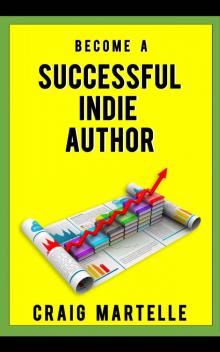 Become a Successful Indie Author
Become a Successful Indie Author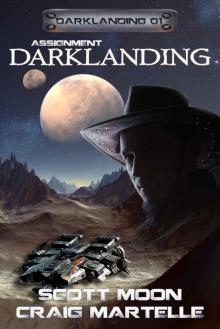 Assignment Darklanding
Assignment Darklanding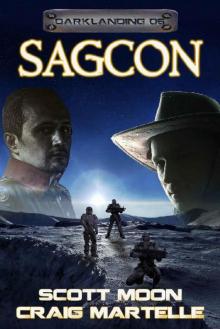 SAGCON
SAGCON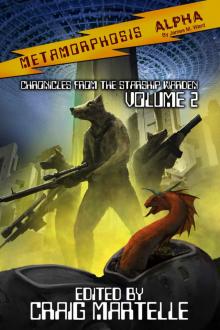 Metamorphosis Alpha 2
Metamorphosis Alpha 2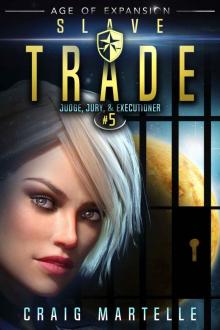 Slave Trade
Slave Trade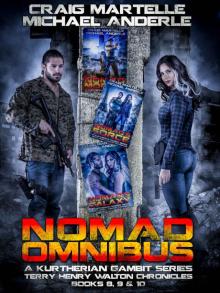 Nomad Omnibus 03: A Kurtherian Gambit Series (A Terry Henry Walton Chronicles Omnibus)
Nomad Omnibus 03: A Kurtherian Gambit Series (A Terry Henry Walton Chronicles Omnibus)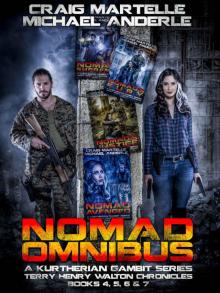 Nomad Omnibus 02: A Kurtherian Gambit Series (A Terry Henry Walton Chronicles Omnibus)
Nomad Omnibus 02: A Kurtherian Gambit Series (A Terry Henry Walton Chronicles Omnibus)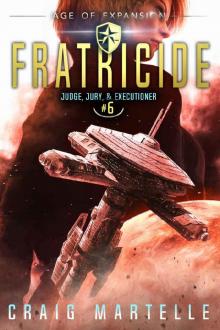 Fratricide
Fratricide Judge, Jury, & Executioner Boxed Set
Judge, Jury, & Executioner Boxed Set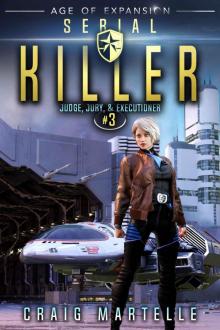 Serial Killer: A Space Opera Adventure Legal Thriller (Judge, Jury, & Executioner Book 3)
Serial Killer: A Space Opera Adventure Legal Thriller (Judge, Jury, & Executioner Book 3)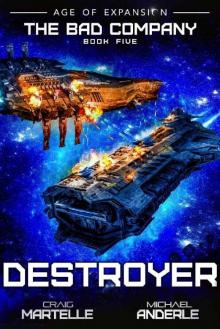 Destroyer: A Military Space Opera (The Bad Company Book 5)
Destroyer: A Military Space Opera (The Bad Company Book 5) Free Trader Complete Omnibus
Free Trader Complete Omnibus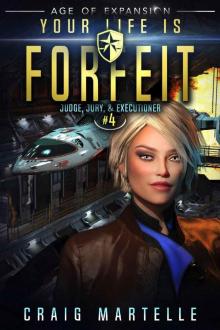 Your Life Is Forfeit: A Space Opera Adventure Legal Thriller (Judge, Jury, & Executioner Book 4)
Your Life Is Forfeit: A Space Opera Adventure Legal Thriller (Judge, Jury, & Executioner Book 4)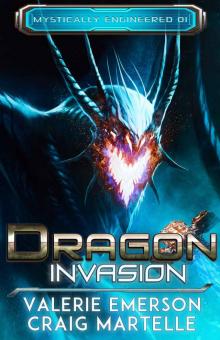 Dragon Invasion
Dragon Invasion The Expanding Universe
The Expanding Universe Race to the Finish
Race to the Finish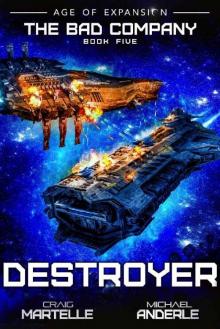 Destroyer
Destroyer Discovery
Discovery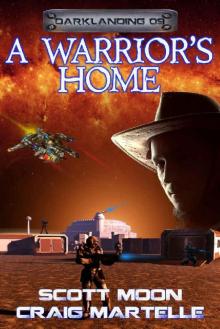 A Warrior's Home: Assignment Darklanding Book 09
A Warrior's Home: Assignment Darklanding Book 09 Nomad's Journal
Nomad's Journal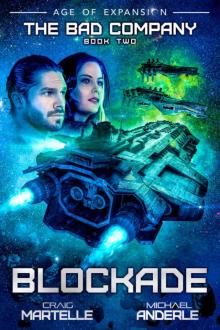 Blockade: Age of Expansion - A Kurtherian Gambit Series (The Bad Company Book 2)
Blockade: Age of Expansion - A Kurtherian Gambit Series (The Bad Company Book 2)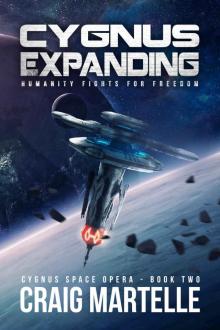 Cygnus Expanding: Humanity Fights for Freedom (Cygnus Space Opera Book 2)
Cygnus Expanding: Humanity Fights for Freedom (Cygnus Space Opera Book 2)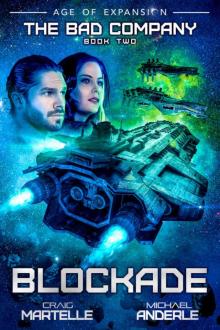 Blockade
Blockade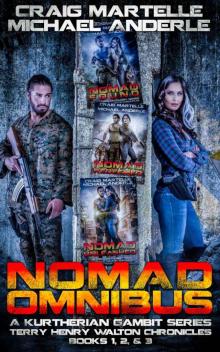 Nomad Omnibus 01_A Kurtherian Gambit Series
Nomad Omnibus 01_A Kurtherian Gambit Series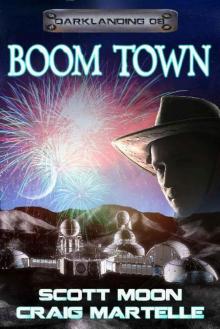 Boom Town
Boom Town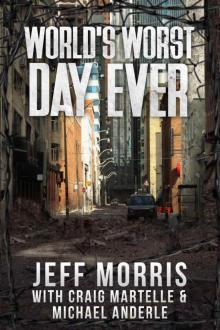 World's Worst Day Ever
World's Worst Day Ever Nomad's Journal_A Kurtherian Gambit Series
Nomad's Journal_A Kurtherian Gambit Series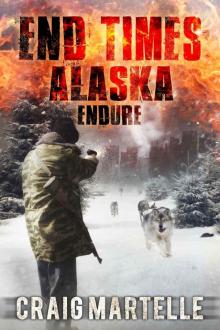 Endure (End Times Alaska Book 1)
Endure (End Times Alaska Book 1) Nomad's Fury: A Kurtherian Gambit Series (Terry Henry Walton Chronicles Book 5)
Nomad's Fury: A Kurtherian Gambit Series (Terry Henry Walton Chronicles Book 5)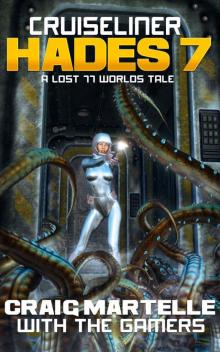 Cruiseliner Hades 7: A Lost 77 Worlds Tale
Cruiseliner Hades 7: A Lost 77 Worlds Tale The Bad Company
The Bad Company Nomad Avenged
Nomad Avenged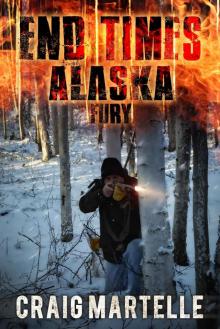 Fury (End Times Alaska Book 4)
Fury (End Times Alaska Book 4) Nomad Mortis
Nomad Mortis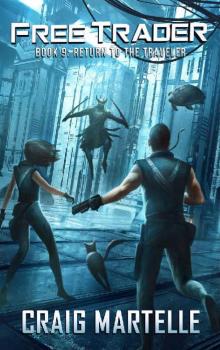 Return to the Traveler (Free Trader Series Book 9)
Return to the Traveler (Free Trader Series Book 9)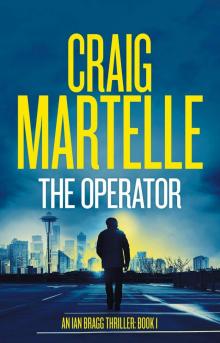 The Operator
The Operator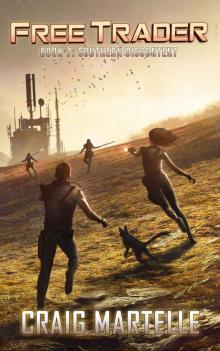 Southern Discontent
Southern Discontent Liberation: Age of Expansion - A Kurtherian Gambit Series (The Bad Company Book 4)
Liberation: Age of Expansion - A Kurtherian Gambit Series (The Bad Company Book 4)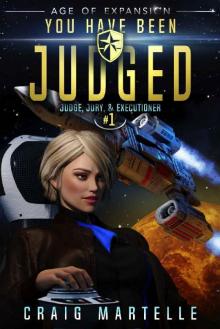 You Have Been Judged_A Space Opera Adventure Legal Thriller
You Have Been Judged_A Space Opera Adventure Legal Thriller Nomad's Galaxy
Nomad's Galaxy Nomad's Force: A Kurtherian Gambit Series (Terry Henry Walton Chronicles Book 9)
Nomad's Force: A Kurtherian Gambit Series (Terry Henry Walton Chronicles Book 9) Gateway To The Universe: In Bad Company
Gateway To The Universe: In Bad Company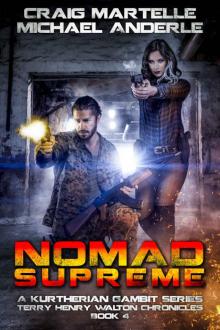 Nomad Supreme: A Kurtherian Gambit Series (Terry Henry Walton Chronicles Book 4)
Nomad Supreme: A Kurtherian Gambit Series (Terry Henry Walton Chronicles Book 4) Nomad Avenged: A Kurtherian Gambit Series (Terry Henry Walton Chronicles Book 7)
Nomad Avenged: A Kurtherian Gambit Series (Terry Henry Walton Chronicles Book 7) Nomad Redeemed: A Kurtherian Gambit Series (Terry Henry Walton Chronicles Book 2)
Nomad Redeemed: A Kurtherian Gambit Series (Terry Henry Walton Chronicles Book 2)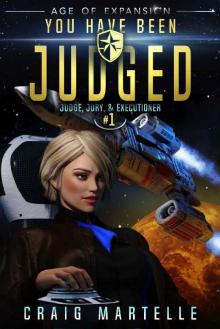 You Have Been Judged
You Have Been Judged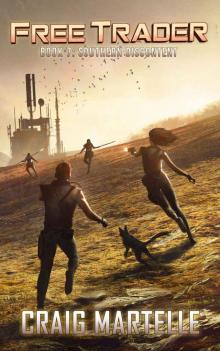 Southern Discontent (Free Trader Series Book 7)
Southern Discontent (Free Trader Series Book 7) Battle for the Amazon (Free Trader Series Book 4)
Battle for the Amazon (Free Trader Series Book 4) Nomad's Galaxy: A Kurtherian Gambit Series (Terry Henry Walton Chronicles Book 10)
Nomad's Galaxy: A Kurtherian Gambit Series (Terry Henry Walton Chronicles Book 10) Nomad's Journal: A Kurtherian Gambit Series (Terry Henry Walton Chronicles)
Nomad's Journal: A Kurtherian Gambit Series (Terry Henry Walton Chronicles)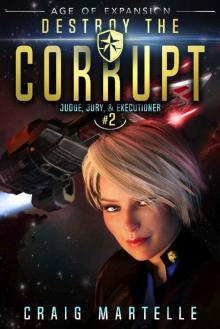 Destroy The Corrupt: A Space Opera Adventure Legal Thriller (Judge, Jury, & Executioner Book 2)
Destroy The Corrupt: A Space Opera Adventure Legal Thriller (Judge, Jury, & Executioner Book 2)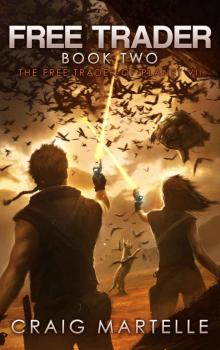 The Free Trader of Planet Vii
The Free Trader of Planet Vii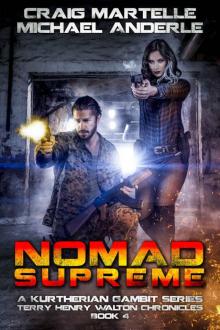 Nomad Supreme
Nomad Supreme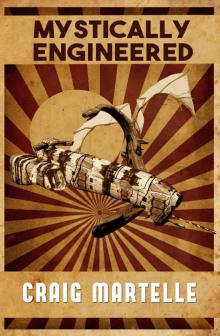 Mystically Engineered
Mystically Engineered Free Trader Box Set - Books 4-6: Battle for the Amazon, Free the North!, Free Trader on the High Seas
Free Trader Box Set - Books 4-6: Battle for the Amazon, Free the North!, Free Trader on the High Seas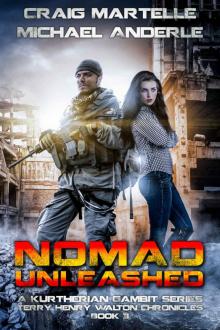 Nomad Unleashed
Nomad Unleashed Nomad's Force
Nomad's Force The Great Cat Rebellion (Free Trader Series Book 8)
The Great Cat Rebellion (Free Trader Series Book 8) Nomad's Fury
Nomad's Fury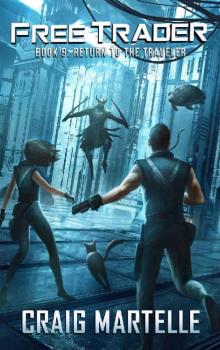 Return to the Traveler
Return to the Traveler Nomad's Justice
Nomad's Justice Nomad's Justice: A Kurtherian Gambit Series (Terry Henry Walton Chronicles Book 6)
Nomad's Justice: A Kurtherian Gambit Series (Terry Henry Walton Chronicles Book 6)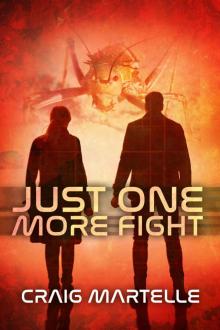 Just One More Fight
Just One More Fight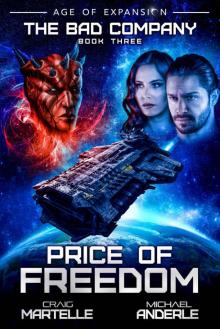 Price of Freedom
Price of Freedom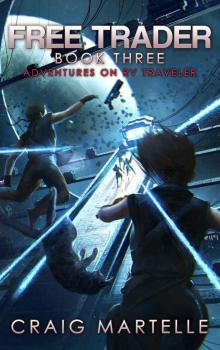 Adventures on RV Traveler (Free Trader Series Book 3)
Adventures on RV Traveler (Free Trader Series Book 3)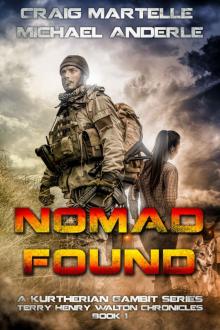 Nomad Found
Nomad Found Liberation_Age of Expansion_A Kurtherian Gambit Series
Liberation_Age of Expansion_A Kurtherian Gambit Series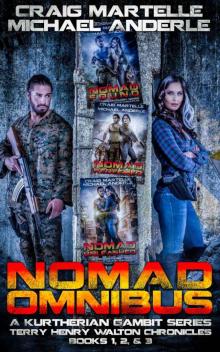 Nomad Omnibus 01: A Kurtherian Gambit Series (A Terry Henry Walton Chronicles Omnibus)
Nomad Omnibus 01: A Kurtherian Gambit Series (A Terry Henry Walton Chronicles Omnibus)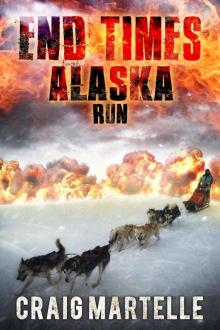 Run (End Times Alaska Book 2)
Run (End Times Alaska Book 2) The Free Trader of Warren Deep (Free Trader Series Book 1)
The Free Trader of Warren Deep (Free Trader Series Book 1) Cygnus Rising: Humanity Returns to Space (Cygnus Space Opera Book 1)
Cygnus Rising: Humanity Returns to Space (Cygnus Space Opera Book 1)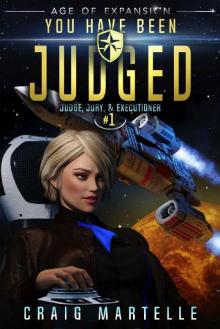 You Have Been Judged: A Space Opera Adventure Legal Thriller (Judge, Jury, & Executioner Book 1)
You Have Been Judged: A Space Opera Adventure Legal Thriller (Judge, Jury, & Executioner Book 1) The Expanding Universe 4: Space Adventure, Alien Contact, & Military Science Fiction (Science Fiction Anthology)
The Expanding Universe 4: Space Adventure, Alien Contact, & Military Science Fiction (Science Fiction Anthology)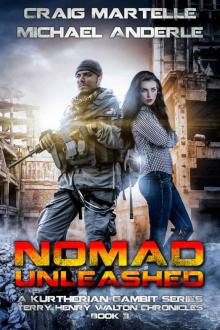 Nomad Unleashed: A Kurtherian Gambit Series (Terry Henry Walton Chronicles Book 3)
Nomad Unleashed: A Kurtherian Gambit Series (Terry Henry Walton Chronicles Book 3) The Great Cat Rebellion
The Great Cat Rebellion Nomad Redeemed
Nomad Redeemed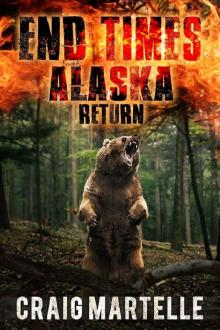 Return (End Times Alaska Book 3)
Return (End Times Alaska Book 3)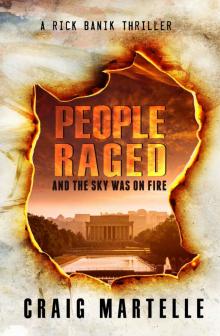 People Raged: and the Sky Was on Fire-Compendium (Rick Banik Thrillers Book 1)
People Raged: and the Sky Was on Fire-Compendium (Rick Banik Thrillers Book 1) Nomad Mortis: A Kurtherian Gambit Series (Terry Henry Walton Chronicles Book 8)
Nomad Mortis: A Kurtherian Gambit Series (Terry Henry Walton Chronicles Book 8)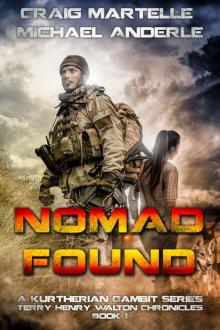 Nomad Found: A Kurtherian Gambit Series (Terry Henry Walton Chronicles Book 1)
Nomad Found: A Kurtherian Gambit Series (Terry Henry Walton Chronicles Book 1) Cygnus Arrives: Humanity Returns Home (Cygnus Space Opera Book 3)
Cygnus Arrives: Humanity Returns Home (Cygnus Space Opera Book 3)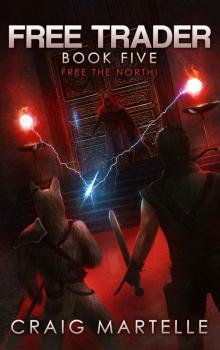 Free the North! (Free Trader Series Book 5)
Free the North! (Free Trader Series Book 5)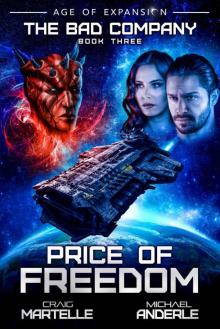 Price of Freedom: Age of Expansion - A Kurtherian Gambit Series (The Bad Company Book 3)
Price of Freedom: Age of Expansion - A Kurtherian Gambit Series (The Bad Company Book 3)